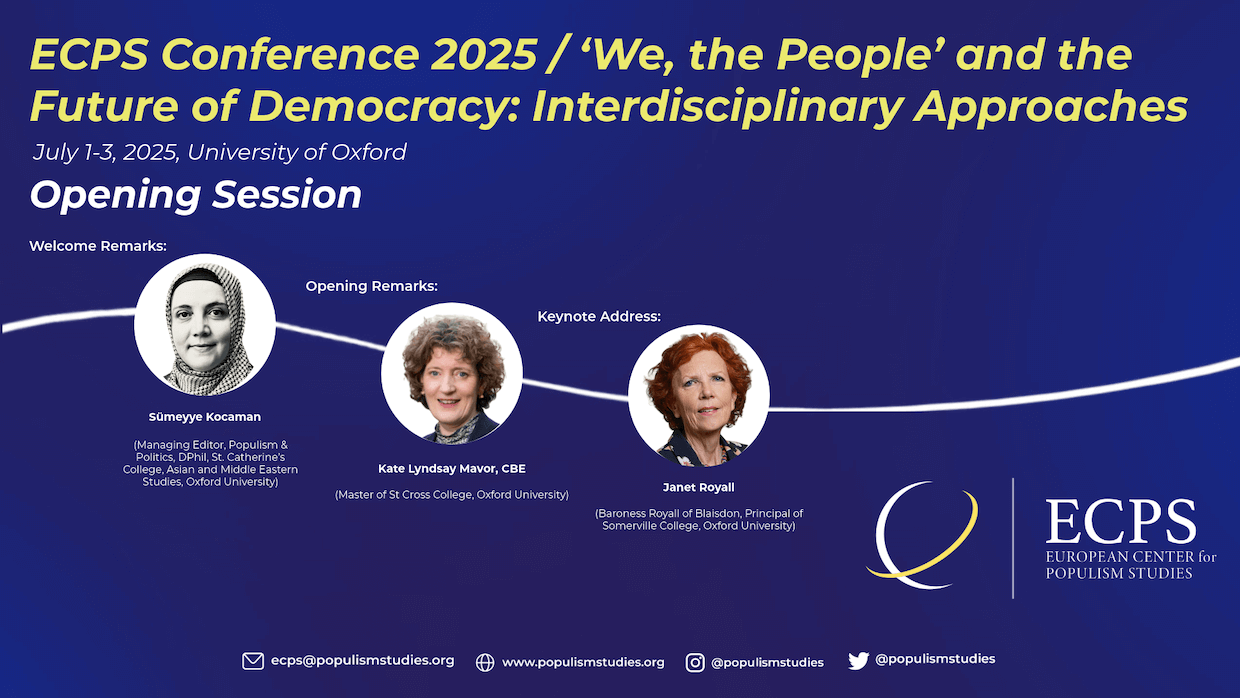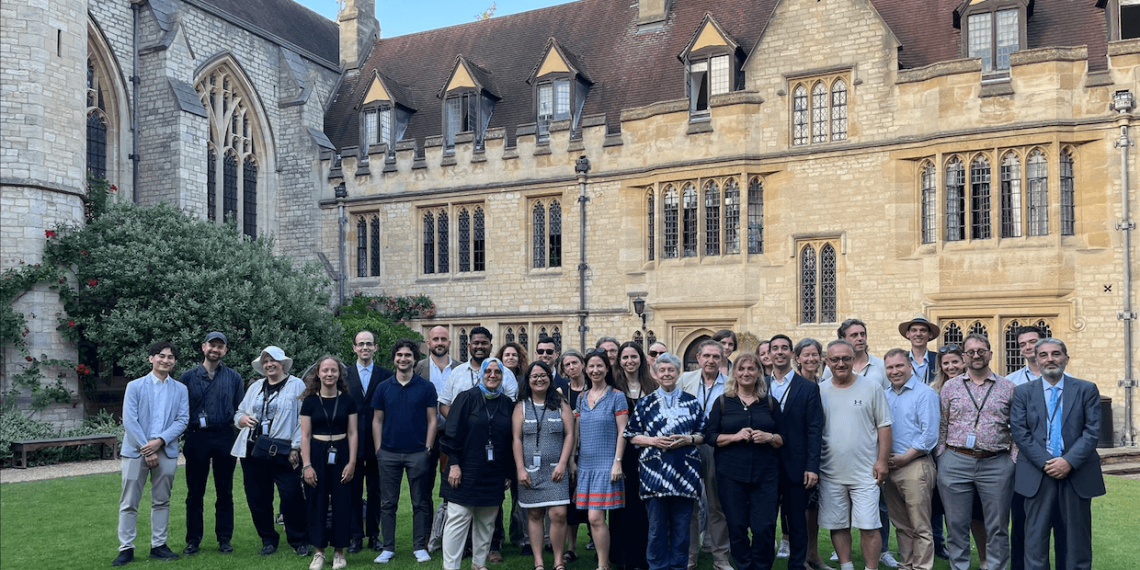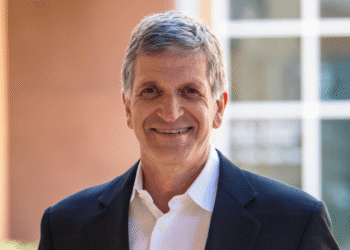Explore the key debates from “We, the People and the Future of Democracy: Interdisciplinary Approaches,” held at Oxford University in July 2025. The conference brought together leading scholars to examine how “the people” are invoked to both erode and renew democracy worldwide. Now, readers and audiences can access detailed reports and full video recordings of all panels and roundtables—an essential resource for anyone engaged with questions of democratic resilience, populism, identity, and governance. Revisit these rich interdisciplinary discussions and reflect on a central challenge of our time: under what conditions can appeals to “the people” revitalize democracy rather than undermine it? Engage now with the ideas shaping the global conversation on democracy’s future.
Reported by ECPS Staff
Between July 1–3, 2025, scholars, practitioners, and students gathered at St. Cross College, Oxford University, for We, the People and the Future of Democracy: Interdisciplinary Approaches—an intensive programme examining how invocations of “the people” shape democratic resilience and backsliding globally. The ECPS event unfolded against a sobering backdrop: between 2012 and 2024, one-fifth of the world’s democracies disappeared, while rising populist discourse—framing politics through stark “us vs. them” binaries—has undermined social cohesion across many societies.
Throughout the programme, participants explored how the concept of “the people” can both erode and renew democratic life. Panel and roundtables interrogated when this notion acts as a democratizing force and when it becomes a tool for exclusionary majoritarianism. The interdisciplinary and comparative nature of the discussions was key: scholars from history, philosophy, political theory, sociology, law, and the arts examined the interplay between populism, identity, legitimacy, and governance across transatlantic and global European contexts.
Major themes included the conceptual ambiguity of “the people” as a political category; its mobilization in both progressive and authoritarian populisms; the impact of identity politics on liberal democratic institutions; the entanglement of religion, nationalism, and populism; the challenges posed by algorithmic governance and AI; and the resilience or vulnerability of constitutional structures under populist pressure. Sessions addressed populist assaults on democratic checks and balances, the politicization of referenda, the erosion of judicial independence, and contested narratives around belonging, migration, and climate policy.
The event also served as the launch of an extended virtual programme (September 2025–April 2026), designed to continue this dialogue through bi-weekly online workshops, encouraging sustained scholarly exchange on the crisis and promise of democracy.
The programme underscored a central question: under what conditions can appeals to “the people” revitalize democratic politics rather than undermine its pluralistic foundations? By fostering dialogue across disciplines and global perspectives, We, the People and the Future of Democracy offered a critical intervention into one of today’s defining global challenges, illuminating both the fragility and resilience of democracy in the 21st century.
Taking this occasion as an opportunity, ECPS expresses its profound gratitude to St. Cross College for hosting this conference; to our valued partners—the Oxford Network of Peace Studies (OxPeace), Rothermere American Institute, Humanities Division, European Studies Centre at St Antony’s College, and Oxford Democracy Network—for their vital collaboration; and to all our sponsors, whose support made this timely and urgent gathering not only possible but truly impactful.
Readers and audiences can access comprehensive reports and full video recordings of all sessions from the three-day conference below, providing an opportunity to revisit and engage with the rich, interdisciplinary discussions that unfolded throughout the event.
Opening Session

The ECPS Conference 2025 at the University of Oxford began with a timely and thought-provoking opening session that explored the evolving meaning and political utility of “the people” in democratic discourse. Sümeyye Kocaman offered a nuanced welcome, highlighting how the term has been used across history to empower, exclude, and politicize identity. Kate Mavor, Master of St Cross College, underscored the value of interdisciplinary exchange in addressing democratic challenges, noting how the College’s diverse academic environment aligned naturally with the conference’s aims. Baroness Janet Royall then delivered a compelling keynote, warning of the double-edged nature of “the people” as both democratic ideal and populist tool. Her address emphasized the need for inclusion, institutional integrity, civic renewal, and interdisciplinary cooperation in the face of democratic erosion. The session set the stage for critical and globally relevant dialogue across disciplines.
Panel I — Politics of Social Contract
Panel I brought together diverse approaches to examine how democratic legitimacy, resistance, and pluralism are evolving in the face of global democratic backsliding. Chaired by Dr. Lior Erez (Oxford University), the panel featured Professor Robert Johns and collaborators presenting experimental research on public support for human rights under repression; Nathan Tsang (USC) explored how Hong Kong diaspora communities engage in covert resistance through cultural expression; and Simon Clemens (Humboldt University) introduced Isabelle Stengers’ cosmopolitical philosophy, proposing a radical politics of coexistence over consensus. Together, the presentations reflected on how the idea of “the people” is being contested, reimagined, and mobilized across social, empirical, and philosophical registers.
Roundtable I — Politics of the ‘People’ in Global Europe
Chaired by Professor Jonathan Wolff, the session explored how “the people” is constructed, contested, and deployed in contemporary European and global politics. Presentations by Professors Martin Conway, Aurelien Mondon, and Luke Bretherton examined the historical resurgence of popular politics, the elite-driven narrative of the “reactionary people,” and the theological dimensions of populism. Together, the contributions offered a nuanced, interdisciplinary account of how populism’s democratic and anti-democratic potentials shape the political imagination and institutional realities of the 21st century.
Panel 2 — “The People” in the Age of AI and Algorithms
Panel II explored how digital technologies and algorithmic infrastructures are reshaping democratic life. Co-chaired by Dr. Alina Utrata and Professor Murat Aktaş, the session tackled questions of power, exclusion, and political agency in the digital age. Together, their framing set the stage for two timely papers examining how algorithmic filtering, platform capitalism, and gendered data practices increasingly mediate who is counted—and who is excluded—from “the people.” With insight and urgency, the session called for renewed civic, academic, and regulatory engagement with the democratic challenges posed by artificial intelligence and transnational tech governance.
Panel III gathered five scholars from the Jean Monnet Chair in European Constitutional Democracy (EUCODEM) at the University of Barcelona to explore how populist forces are challenging liberal-democratic norms—and what institutional remedies might resist them. Chaired by Dr. Bruno Godefroy, the session addressed threats to judicial independence, the populist appropriation of secessionist demands, and the theoretical underpinnings of populism as a political strategy. It also examined the role of parliaments and second chambers in preserving constitutional order. Drawing from both comparative and case-specific perspectives—ranging from Spain and Scotland to Canada and the United States—the panel provided a timely and interdisciplinary diagnosis of populism’s constitutional impact and offered potential avenues for democratic resilience in increasingly polarized societies.
Panel 4 — Politics of Belonging: Voices and Silencing
Panel IV explored the theme “Politics of Belonging: Voices and Silencing.” Chaired by Dr. Azize Sargın (ECPS), the panel investigated how belonging is constructed and contested through populist discourse and historical memory. Dr. Maarja Merivoo-Parro (University of Jyväskylä) examined olfactory memory and grassroots aid in Estonia’s democratic awakening. Maria Jerzyk (Masaryk University) analyzed how the figure of the child is symbolically instrumentalized in Polish populism, revealing deep continuities with communist-era narratives. Together, the papers offered rich insights into how identity, exclusion, and affect shape democratic participation in post-authoritarian and populist contexts.
Roundtable II — ‘The People’ in and against Liberal and Democratic Thought
Roundtable II offered a wide-ranging philosophical and political interrogation of how “the people” is theorized, invoked, and contested in contemporary democratic thought. Chaired by Dr. Aviezer Tucker (University of Ostrava), the session featured presentations by Naomi Waltham-Smith (Oxford), Bruno Godefroy (Tours), Karen Horn (Erfurt), and Julian F. Müller (Graz). Together, the panel explored the rhetorical, constitutional, and epistemic instabilities surrounding the concept of “the people,” challenging static or essentialist understandings and calling for renewed attention to pluralism, temporality, and audibility within liberal democratic frameworks.
Panel 5 — Governing the ‘People’: Divided Nations
Panel V explored how contested constructions of “the people” are shaped by populist discourse across national, religious, and ideological contexts. Co-chaired by Dr. Leila Alieva and Professor Karen Horn, the session featured presentations by Natalie Schwabl (Sorbonne University), Dr. Sarah Riccardi-Swartz (Northeastern University), and Petar S. Ćurčić (Institute of European Studies, Belgrade). The panel examined Catholic nationalism in Croatia, American Christian ethno-populism, and the evolving German left, offering sharp insights into the manipulation of collective identity and memory in populist projects. Bridging multiple regions and disciplines, the panel revealed populism’s capacity to reframe belonging in deeply exclusionary and globally resonant ways.
Panel 6 — The ‘People’ in Search of Democracy
Panel VI brought urgent focus to the evolving meaning of democratic agency. Chaired by Dr. Max Steuer (Comenius University, Bratislava), the session opened with a reflection on whether democracy and “the people” can be conceptually disentangled. Rashad Seedeen examined how Gramsci’s war of position and Wright’s real utopias intersect in Indigenous civil society initiatives. Jana Ruwayha analyzed how prolonged emergencies blur legal norms, threatening democratic accountability. Özge Derman showcased how the “we” is performatively constructed in Occupy Wall Street and the Gezi movement. Together, the panel offered sharp insights into the plural and contested meanings of “the people” in contemporary democratic struggles.
Panel 7 — ‘The People’ in Schröndinger’s Box: Democracy Alive and Dead
In 2025, democracy occupies a state of superposition—at once vibrant and eroding, plural and polarized, legal and lawless. Panel 7 exposed this paradox with precision: democracy is not a fixed ideal but a shifting terrain, where power is contested through law, ritual, narrative, and strategy. Whether it survives or collapses depends on how it is interpreted, performed, and defended. The Schrödinger’s box is cracked open, but its contents are not predetermined. As Robert Person warned, authoritarian actors exploit democratic vulnerabilities; as Max Steuer and Justin Attard showed, those vulnerabilities also reveal possibilities for renewal. We are not neutral observers—we are agents within the experiment. Democracy’s future hinges on our will to intervene.
Panel 8 — ‘The People’ vs ‘The Elite’: A New Global Order?
Panel 8 offered a rich exploration of populism, elite transformation, and democratic erosion. Co-chaired by Ashley Wright (Oxford) and Azize Sargın (ECPS), the session featured cutting-edge scholarship from Aviezer Tucker, Pınar Dokumacı, Attila Antal, and Murat Aktaş. Presentations spanned elite populism, feminist spatial resistance, transatlantic authoritarianism, and the metapolitics of the French New Right. Discussant Karen Horn (University of Erfurt) offered incisive critiques on intellectual transmission, rationalism, and democratic thresholds. Together, the panel underscored populism’s global diffusion and its capacity to reshape both elites and “the people,” demanding renewed theoretical and civic engagement. Democracy, the panel emphasized, remains a contested space—never static, always in motion.
Roundtable III — When the Social Contract is Broken: How to Put the Genie Back
Roundtable 3 explored how broken social contracts have fueled populism and democratic disillusionment. The session featured Selçuk Gültaşlı’s summary of Eric Beinhocker’s fairness-based model of democratic collapse, Dr. Aviezer Tucker’s critique of elite entrenchment, Lord Alderdice’s focus on emotional wounds like humiliation and disillusionment, and Professor Julian F. Müller’s call for conceptual clarity around populism. Concluding the session, Irina von Wiese grounded abstract theory in lived inequality and called for renewed trust, dignity, and participation. The panel made clear: rebuilding democracy requires more than policy—it demands empathy, fairness, and respect for those left behind.


